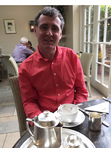Martin Jones's Blog
September 7, 2025
Infinite Jest by David Foster Wallace – Omaha Beach Read

The second chapter of Infinite Jest involves a man waiting for a woman to arrive with a marijuana delivery. This is absolutely the last time he is going to use marijuana. To make sure that this last time is really the last time – unlike all the other last times – extreme measures are called for. He is going to smoke so much marijuana that the very idea of the stuff will become disgusting. This debauch will be a heroic and disciplined effort. He’ll keep smoking, when every instinct is telling him to stop, and so finally win freedom from marijuana.
Infinite Jest is similar to this upside down approach to drug rehabilitation. Discipline is required to make your way through hundreds of thousands of off-kilter words, and a wandering plot about a film so compelling that anyone seeing it has no choice but to watch again and again. On the other hand, the reading experience is like retreating into hedonism, giving up on your job, the chores, not posting any reviews on your blog for weeks, just to read through these endless pages.
I suppose in the end, Infinite Jest is about good books, as in what they are and how they work. A book is often considered good in making a reader feel they can’t put it down, becoming like an addictive drug in that sense. But we all know that addictive drugs are very bad for you, physically and mentally – with reminders of the hazards, if we need them, provided by the many scenes in Infinite Jest involving drugs. So maybe a good book is one you really can put down for some reason, maybe because it’s cheap sensationalism and not worth your time, or conversely because it’s a challenging read, requiring effort and thought, and giving opportunity for demanding essay topics. Infinite Jest is at times unputdownable, over-the-top and hilarious, at other times so horrible, in both subject matter and textual difficulty, that it begs to be put down. In fancy, intellectual terms there are references to Bertolt Brecht and his idea that an audience should be pushed away from a beguiling, hypnotic, theatrical experience, to think for themselves. Infinite Jest remains both chunky, sensationalist entertainment and an austere Brechtian production, insisting that the reader take a fair share of the heavy lifting. This might be the best book, or the worst book, but is rarely anything inbetween. I was both sad and hugely relieved to get to the end of something that was like a drug with its own built-in antidote.
Infinite Jest by David Foster Wallace was published in 1996 and is on the Time Magazine list for best novels in English 1923 – 2005.
July 13, 2025
Love in a Cold Climate by Nancy Mitford – Love is a Hot Mess!

Love in a Cold Climate is Nancy Mitford’s famous satire of the English aristocracy in the 1920s and 30s. Fanny is the narrator, a young woman who has spent her childhood with relatives, while her wealthy parents travelled and had love affairs. She watches as Lord and Lady Montdore of Hampton try to marry off their beautiful daughter Polly to someone suitable. Polly’s eventual choice of husband causes such shock and family turmoil, that the ageing Montdores disinherit her. For the purposes of the lavish Hampton legacy, they turn to a distant male cousin. Enter Cedric, dandy and aesthete, who quite turns Lady Montdore’s head.
It is interesting that Cedric modifies his dandified chit-chat to fit whatever audience he is seeking to entertain at any given moment. With Lady Montdore it’s all gossip and beauty tips. In the company of an Oxford don, it’s ‘burial custom in the High Yemen’. Love in a Cold Climate is a bit like that. You can read it as a fun soap opera, full of over the top characters. But if someone with intellectual presumptions were to accidentally pick it up, then the book can oblige there as well. After all, the title suggests a comparative study of love in different cultures. And in a strange sort of way that’s what Love in a Cold Climate is. Polly and her parents have recently returned from India where Lord Montdore was Viceroy. There is definitely a suggestion that love was freer under the topic sun. On the other hand when it comes to marriage, the cultural expectation in India was one of families tending to arrange unions to suit their interests. There is, of course, a similar tradition amongst the British upper classes. All the pressure of Polly’s situation comes from the fact that her parents want an alliance that will bring benefit to the Montdores, while Polly wants to follow her heart. She eventually succeeds in doing this but the consequences are less than happy. While arrangement can put two incompatible people together, a choice based on unpredictable human emotion hardly provides a reliable alternative.
This book certainly would not claim to be a comprehensive sociological study of love customs in the Home Counties – just as it can’t be considered a monograph on burial custom in the High Yemen. Nevertheless, when you’re dealing with something that involves deep emotions and superficial self-interest, hurt, joy, passion, easy companionship, hair primping and dressings-up, then maybe the unemotional academic approach is not the best way to understand the subject under consideration. Maybe you can learn something from a rom-com like Love in a Cold Climate.
July 1, 2025
Project Hail Mary by Andy Weir – Problems and Solutions

Project Hail Mary is a science fiction novel by Andy Weir, shortlisted for the 2022 Hugo Award.
A bloom of space algae called astrophage, invades the solar system. Using sunlight for energy, astrophage causes the sun to start cooling, threatening disaster for Earth. A high school science teacher, and former hotshot scientist, Ryland Grace, is recruited to address this crisis. He is sent off in a space ship to investigate a nearby star that shows signs of astrophage infestation, but for some reason has not dimmed. Maybe an answer to the Sun’s problem lies with this star.
The main thing I enjoyed about Project Hail Mary was the relationship between Grace and an alien he meets on his travels. Their working together was fun, moving and interesting, in the sense of exploring the truths that might form the common ground for communication between humanity and alien life.
The main ‘truth’ in the book does not really involve the periodic table or scientific concepts, although there is plenty of all that. The truth that comes up repeatedly is the idea that problems contain their own solutions. Astrophage is both a really big problem and an equally big opportunity. This life form has evolved to store huge amounts of energy. Grace’s space ship actually uses astrophage for fuel, allowing him to get to the star where the answer to controlling astrophage might lie. This book really is one problem after another. The sequence was – problem, anxiety, solution, the answer typically deriving from the difficulty.
Did the idea that problems contain their own solutions come over as a universal truth, or as trite cliche? Maybe something can be a cliche because it is true. People are always looking for answers, but don’t find satisfaction with the same ones over and over again, even if they are correct. One way or another people want to keep moving on, and their favourite solutions are the ones that contain interesting new problems. So yes, I did feel the book explored something with a wide relevance. Maybe the repeated pattern of problem, anxiety, solution did get a little monotonous at times, but this was certainly an interesting story.
June 23, 2025
Perfume by Patrick Suskind – T. rex Had a Great Sense of Smell

Patrick Suskind’s 1985 novel Perfume is one of the 20th century’s best selling German novels, winner of the World Fantasy Award, and the PEN Translation Prize for the English edition by John Woods. It’s about an eighteenth century Parisian man, born with a superhuman sense of smell, and a lack of any normal moral sense. He will stop at nothing in his efforts to make the world’s greatest perfume.
I will tell you right away that this is a weird and dark book, its creepiness deriving from the fact that we are in the realm of smell. Smell, as I have learned with a bit of background reading, is the most ancient of senses, evolving from the primeval ability of early life forms to understand the chemical make-up of their environment.
A book set in an aromatic world is in tricky territory because reading is a visual, or auditory, experience. A ‘smell book’ would be very revealing in some ways, reaching places that the other senses could not, while also having the ability to trigger all sorts of emotions and memories. But the structure of the narrative would be all over the place. Smells linger and merge. Chapter one might not really end on its last page, but potentially persist into all the chapters that come after. And the last chapter could very well waft into the first. Also the book would be very short on thought and analysis. You smell things like manure and roses, not justice or the law. Old books smell, literature does not. We are talking something elemental here, which does not recognise abstractions. Smell is like an ancient world, which survives into the present day as a kind of Jurassic Park. Actually, the novel Perfume could be compared to that film – a fanciful portrayal of a reborn primeval force, sometimes beautiful, often scary and violent, with a terrifying T. rex central character who cannot be confined, despite the cheery confidence of Richard Attenborough. Very interesting, but approach with caution, and don’t expect to find the experience entirely pleasant.
June 20, 2025
The Story of the Lamp by F.W. Robins – Sitting Beside the Fire

The Story of the Lamp (and the Candle) is a history of artificial light, by F.W. Robins, published in 1939. I read the book as research for a novel I am writing which involves candles.
This book has a lot of detail about individual types of lamp and candle through the ages. But it’s also good on the big picture, of how fire and light have influenced human history. The evolution of technology, from pottery, metal work, and all other related crafts, to engines – whether that’s steam, internal combustion or rocket – through to the generation of electricity and everything that comes with it, derives from the control of fire. This breakthrough also had the effect of greatly expanding the time available for people to do things. Not much can be done in the dark, but people had the ability to turn night into day. Given the revolution this represents, it is not surprising that a veneration of fire and light has echoed down the centuries. The Story of the Lamp was very good at tracing these echoes. As just one example, the centre of ancient societies was the communal hearth. At some point someone discovered you could take a small portion of that light and heat into the surrounding darkness, in the form of a burning stick, which became a taper, then a candle; or it became a lamp, burning the fat that came from cooking, done on that same communal hearth. These separate flames could go off and wander about, even set themselves up in new communities, while always maintaining their link with the original fire. They were small parts of the whole. As just one example of the echoes that remain of this long lost primal camp fire, the epilogue suggests we think about the tradition of the Olympic flame, lit every five years at Olympia, and then taken off to wherever the Olympic Games has set up its new camp.
The Story of the Lamp shows how the present is a mirror of the past. All the aspects of our complex world can be traced back to people sitting next to a camp fire they managed to start and maintain. That is rather comforting. At the same time, the book serves as a reminder that ancient people saw danger in the seemingly miraculous gift that made their lives so much better and brighter. This fear was part of respect they felt for what they had been given. Maybe we could do with some of that
June 14, 2025
The Wall by John Lanchester – All in All You’re Just Another Brick

The Wall is a 2019 novel by John Lanchester, taking the rhetoric of Brexit to its metaphorical extreme by imagining a dystopian future where Britain is surrounded by a concrete wall. This barrier has a dual role, holding back both rising sea levels and migrants who are trying to escape climate disaster further south – known as Others in the book. The narrator is Kavanagh, a newbie wall guard, doing his obligatory national service.
The sections I found most interesting were the passages where Kavanagh is just hanging around on the wall. There isn’t much to do except think. We get some subtle sense that a wall is never a simple barrier between us and them. Who are we and who are they? Have a look at this short passage, for example, where Kavanagh thinks about his opposite number on the Wall duty roster:
When you came on shift you always hated the person you were relieving. The fact that you knew the other set of emotions so completely, that you knew exactly what the other person was feeling, made it worse. Your shift twin was a person you met twice a day, about whom you had very strong opinions, who you didn’t really know.’
In a way, the other you, your twin who does what you do for the twelve hours when you’re off duty is as unknown as the Others out there beyond the wall. Given a slight twist of fate you could easily exchange places with them. Maybe you are one of them already – as we see in the case of a senior officer on the Wall who used to be an Other.
There is a lot of that sort of thing. At one point we encounter a group of ruthless people who are really bad people, who act selfishly for nothing but their own gain. Are they truly the Others who we have to keep out, or are they a reflection of a people who refuse to help others on a national scale?
There is action in the book. It’s not all a young man hanging around thinking. But I would say the real action goes on inside Kavanagh’s head. Personally I would have had less action and more of Kavanagh mooching about. As Anthony Powell once wrote
“Action might have confused the issue by proving too exciting. Action is, after all, exciting rather than interesting.”
But that’s just me.
This book is an interesting reflection of its times, using a highly unsubtle, simple-minded caricature of an answer to national issues, to explore them in complex ways.
June 12, 2025
Brighton Rock by Graham Greene – Culture in the Scrap Yard

Brighton Rock is Graham Greene’s 1938 novel depicting gangland conflict in 1930s Brighton.
I’ve read that Graham Greene novels can be divided into ‘entertainment’ and ‘serious’. Brighton Rock seems to be included in the entertainment category. The plot involves a murder, the police messing up, a determined, amateur lady sleuth stepping in. The part-time lady sleuth idea goes back to Andrew Forrester’s Mrs Gladden character created in 1864, and had plenty of mileage in the 1930s with Miss Marple, Nancy Drew, Harriet Vane, and others.
If this is a familiar genre thriller, does that mean it can’t be a serious book? Graham Greene was a serious fellow. I think he saw himself as better than some workaday writer of detective fiction. If he was going to write a commercial lady detective story, he was going to use it to reflect on popular culture in general.
What is the popular outlook according to Brighton Rock? In broad outline, it involves an intense, black and white conception of right and wrong, combined with a tendency to emotive superstition, and a trust in ordinary people over experts. The amateur lady sleuth, Ida Arnold, is rigid in her judgements, thinks the police are incompetent fools, and uses seances to provide guidance and clues. So, there’s a scary sense of seeing the world in stark categories of good and bad, who’s in or out, all caught up in a vague wash of emotion and credulity. It’s a combination of the judgemental and a lack of anything substantive on which to base judgements.
Brighton Rock portrays a chaotic society, as strident as it is superficial. This all sounds painfully familiar. Does Greene provide any answers? Well no not really. The mob lawyer character, Prewitt, well educated, with a penchant for quoting Shakespeare, is as much part of this gritty milieu as the young mobsters. And talking of Shakespeare, it has been noted, not just by me, that Brighton Rock, as well as feeling like a violent Miss Marple story, is also reminiscent of something much more high end – Macbeth, no less. Ambitious young man commits murder and then gets pulled into more murder to cover it up. There doesn’t seem to be any meaningful divide between high and low brow in the world of Brighton Rock. Pinkie the young aspiring gangland boss even comes out with Latin phrases on occasion.
So does modern consumer culture swallow everything? That might be one way to look at it. The gang leader Pinkie is a Catholic, and even the ancient Catholic Church might become another expression of the popular outlook. After all, an intense, judgemental, black and white conception of right and wrong, combined with a tendency to emotive superstition, might not just apply to secular Ida and her seances.
I spent a long time thinking about this book, and had a few tries at writing a review. I suppose in the end I came to think of Brighton Rock as a prescient portrayal of how the popular can become the populist. That was certainly interesting. But the bleakness was a bit much. Popular culture isn’t necessarily rubbish. In his time Shakespeare was very much a popular playwright rather than an academic one. Then again maybe Greene would grudgingly agree, since he mixes high and low brow in the way he does. It’s not a gentle mixing, it’s like a scrapyard crushing a Rolls Royce with a Ford Fiesta and presenting a reader with the compacted result. But still, there is a lot to think about here as you look into the tangled mess of what was once Rolls Royce and Ford Fiesta.
June 4, 2025
The Quiet American by Graham Greene – The Ivory Tower Collapses

The Quiet American is a novel by Graham Greene, published in 1955, based on his experience as a war correspondent for the Times and Le Figaro.
British journalist Thomas Fowler has spent a few years in 1950s Saigon, reporting on the tangled mess of unravelling French colonial rule in Indochina. The story opens with some naive whippersnapper entering Fowler’s jaded, but oddly settled existence. Alden Pyle – young, American, Ivy League – turns up, apparently with all the answers to Vietnam’s problems. Pyle might lack practical experience, but he has read a book about foreign policy, and decides this qualifies him to wade into the morass of France’s struggle against various groups of Vietnamese resistance fighters, who also fight amongst themselves. Pyle’s plan is to direct American support to one of the Vietnamese factions, supposedly sympathetic to Western values, and allow this group to take over.
Fowler, meanwhile, is an observer, neutral, not taking sides, because that’s how a writer remains objective. A clergyman tells Fowler at one point, referring to his church:
“We are neutral here. This is God’s territory.”
This suggests that God and a weary British journalist have something in common. Fowler, however, thinks that maybe God should give up his position above it all and pick a side, preferably the side of scared, hungry people who take shelter in the church hoping to escape the fighting. Fowler, lacking Godly qualities, finds it increasingly difficult to stand idly by, as Pyle funnels resources towards a lawless, brutal warlord.
Fowler, the dispassionate writer is eventually forced to come down from his ivory tower, figuratively, and literally actually, since there is a tower in the book, a watch tower where he gets marooned with Pyle, when their car breaks down. The tower is attacked by the Vietnamese and collapses. Fowler finds himself back down on the ground, with a broken leg. This is where he, like all of us, has to make his imperfect judgements.
People are not omniscient. They are involved and subjective. Maybe we should conclude with the sort of religious metaphor characteristic of the book. People are perhaps in the position of Abraham in Genesis, when he tells God that some local perspective is lacking in the big picture judgement of the situation in Sodom and Gomorrah. Before raining down fire, brimstone and napalm for the greater good, there are a few decent people in those cities who should be considered along with all the rest. Don’t kill the innocent along with the guilty – and is it so easy to divide guilt from innocence anyway? Abraham presents the wisdom of his limited view to a superpower claiming to know everything. The Quiet American does the same. The difference, I suppose, is that God to an extent listens to Abraham, Pyle doesn’t listen to Fowler.
May 21, 2025
Dr No by Percival Everett – A Book About Nothing

Dr No is a 2022 novel by Percival Everett. It’s about a maths professor Wala Kitu who studies nothing, as in the concept of nothing. A super villain in the James Bond manner tries to recruit Wala to help in a scheme to break into Fort Knox and steal the stock of nothing which he believes is kept there. The plan is then to use this nothing as a weapon, negating whatever a super villain wants to negate.
When a book considers an unfamiliar topic, I sometimes do a bit of background research before starting a review. I didn’t know much about nothing, but was vaguely aware that people are studying the subject at MIT. So I tried to do an internet search on that, which turned out to be a bit tricky. A Google search for ‘Are scientists at MIT studying nothing?’ resulted in one of those AI summaries which announced indignantly: ‘No, scientists at MIT are not studying nothing, they are studying a whole range…’ with subjects listed. Next I tried: ‘Are scientists at MIT studying the concept of nothing?’ A mollified AI then did a U-turn, telling me about the MIT scientist Daniel Harlow and his studies of profound absence. So, no people are MIT are not studying nothing, and yes they are.
All I can say is that nothing, which might seem to be the simplest of things, as in the absence of any complications whatsoever, turns out to be very complicated. It all started with Otto von Guericke who in 1654 invented a pump that could suck the air out of a hollow copper sphere. In a demonstration of the power of nothing he had two teams of horses trying and failing to pull apart two halves of his copper sphere containing a vacuum. Since then researchers have defined other types of ever more rarified nothing. I won’t go into details. Suffice to say, a subject that seemed simple is really not.
Dr No revolves around these head spinning paradoxes, which makes for a funny, surreal, and philosophical read. This is a book about nothing. You could write a great deal about that; or you could leave it there. Nothing is fiendishly complicated and reassuringly simple. You can take both from Dr No, a spy story with all the easy cliches, which also takes you on a mind boggling journey through the contradictions of nothing which seem to lie beneath everything.
May 13, 2025
All Fours by Miranda July – A Road Trip Heading Home

I reserved Miranda July’s All Fours at the library after hearing it was a road trip book, and had been included on the Women’s Prize for Fiction list.
I soon realised this was not a road trip book. A woman, who has had some sort of successful, unspecified artistic career, reaches her forties and feels herself at a turning point. She decides to go on a solo road trip across America, but only gets as far as a motel about half an hour from home. Here she has a kind of highly creative breakdown, employing her significant personal wealth and febrile imagination to turn her humble motel room into luxury accommodation over three days of intense effort. She then spends the next few weeks in her special room, enjoying the company of a younger man. Their affair is described in the sort of detail that Henry Miller might have used in Tropic of Cancer, if Miller’s protagonist had been a neat and tidy Californian woman rather than a seedy New York man living in Paris. Anyway, following her motel sojourn, the woman returns home and desperately tries to carry on with her normal life, pretending to her husband that her state of acute distraction is due to the menopause. And then, as if fate is having its fun, a routine medical check-up reveals that she is actually approaching this time in her life.
Rather than a road trip, All Fours is about women dealing with the menopause. Although I did wonder at this point if I was the intended audience, I kept reading. Partly this was to learn something about an experience that was not my own. All Fours is very much about the specificity of experience. As well as facing the menopause, which is specific to women, the narrator also recalls suffering a very rare complication during the birth of her child, which causes almost all of the baby’s blood to drain back into the mother. Against all odds the baby survives, but this traumatic experience stays with its mother, so that she is always looking for the few people in the world who would understand what she had been through.
So is this book actually for woman who have suffered the rare birth complication known as fetal maternal haemorrhage?
To answer that question, notice I have not mentioned the name of the narrator. This is because she isn’t given one. The lack of a name goes along with her mysterious job, never fully described. There is a lack of specificity here – like the narrator is ‘Everywoman’ or something. It makes you wonder if the fact that we all experience life slightly differently constitutes our common ground.
The trend in fiction writing is towards fragmentation, with different books designed for different groups of people. Of course people have always read novels to take them outside their normal experience, just as they’ve always wanted to go on road trips to new and unfamiliar places. But every road trip eventually brings you home again, and a novel, if it’s good, will still reflect something that we all tend to recognise as familiar. And maybe that sense is more important than ever. All Fours does both specific and general in a very interesting way.
The book might not be to everyone’s taste, but it still manages to take the individuality of taste and make you think about it, combining sparky wit with affecting emotion, particularly in the first half. I’m glad I read it.



